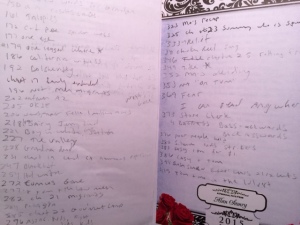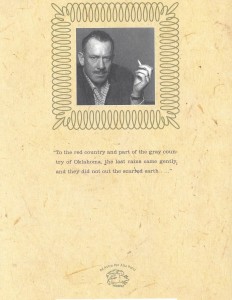Our book club, “Drinkers With a Reading Problem” met at Fairhope Brewing on Sunday evening. Thirteen of us, a large turnout for our group, came to discuss John Steinbeck’s The Grapes of Wrath.

We agreed to let Betty take the lead for this book. She immediately suggested we go around the table and air our impressions.
Irene talked about Steinbeck’s “marvelous descriptions.”
I mentioned that I had read the book in high school. It’s been thirty years since I read the book, and I explained to the group that the movie “clouded my memories of the book, especially the end.” I praised Steinbeck, as most did, and compared him to Hemingway and Sinclair.
While I could not recollect any memories, feelings, or reactions when Rose of Sharon lets a dying stranger suckle from her breast, many book clubbers commented on the scene.
Bob mentioned that the title of the book was a verse from the “Battle Hymn of the Republic,” and The Bible. He offered some Midwestern sensibility by suggesting that Rosasharn, if you are from the Midwest sounds an awful lot like rose is sharing, demonstrating the epitome of the word in that final scene.
Bob also felt that the Joads “lost a human scale,” once the tractors arrived.
A newcomer to the area and the club, who had not finished the book, used the opportunity to network. She’s in need of a job teaching High School English.
Judy talked about the significance of the turtle in Chapter 3 and it’s larger meaning for the Joad’s and humanity. She pulled out some notes about the shrub, rose of Sharon, and it’s horticultural properties, many of which aligned superbly with the character traits she was given by Steinbeck.
Betty quoted the scene with Casy the preacher and the roadside burial of Grampa.
This here ol’ man jus’ lived a life an’ jus’ died out of it. I don’ know whether he was good or bad, but that don’t matter much. He was alive, an’ that’s what matters. An now he’s dead, an’ that don’t matter. Heard a fella tell a poem one time, an’ he says ‘all that lives is holy.’ (144)
Wilson had started to read the book for a second time but got derailed by “the dialect.” He wound up listening, then playing his guitar and singing some Woody Guthrie tunes.
Robert called the book the “consciousness of America during the Depression and the labor movement.” He recommended another book by Steinbeck, Travels with Charley.
Donna praised the novelist for his, “use of description and for the evolution of the characters.”
Suzanne, and a few other, noted how depressing the book was, but empathized with the characters, and so continued to read. Despite these tests or perhaps because of them we read because we all endure.
After we all had a chance to comment we listened to Guthrie’s “Tom Joad, Part One and Two.” I think it was our second Bob, from Kentucky and a fan of Guthrie, who called the song another form of “Cliff Notes.”
I mentioned how the book was banned and how literature transcends the arts as The Grapes of Wrath is told in music, first through Guthrie, then Springsteen’s “The Ghost of Tom Joad,” which was covered by Rage Against the Machine, a song I carry with me on my phone.
Elliott, the club’s founding member, selected this month’s book. He arrived late, but quickly dove into the music conversation.
When I left the meeting, I didn’t know what to write about. It was my own fault that I was stumped. I didn’t bring one of my favorite scenes for consideration. In this scene Tom Joad and his brother Al meet a slovenly man with one eye. Tom doesn’t give a crap about his disability. Fix yourself up, get clean, put a patch over that eye Tom says. Then he tells the junk yard man a story.
Why, I knowed a one-legged whore one time. Think she was takin’ two bits in a alley? No, by God! She’s gettin’ half a dollar extra. She says, ‘How many one-legged women you slep’ with? None!’ she says. (179)
My regret was not hearing from others about this scene, given that I’m an amputee. After some reflection and distance from our wonderful discussion on a literary classic, I found my notes, and stuck my nose back in the book.
It turns out that Tom needed to learn that all living things, the turtle, the one-eyed man, and the one-legged whore are all holy.
Then I reread this oft quoted passage where Tom Joad, who is hiding out in his own wilderness, is telling his Ma what he learned from Casy.
Says one time he went out in the wilderness to find his own soul an’ he foun’ he didn’ have no soul that was his’n. Says he foun’ he just got a little piece of a great big soul. Says a wilderness ain’t no good, cause his little piece of a soul wasn’t no good less it was with the rest and was whole. Funny how I remember. Didn’ think I was even listenin’. But I now know a fella ain’t no good alone. (418)
The wilderness is where we do our thinking, if we are lucky to have the inclination, freedom, and time to do so. You can’t spend your whole life in the wilderness.
I can’t say for sure whether I’ve got a soul when I’m alone, thinking, and wandering around in my writing wilderness. I know I need that time, but I know I can’t stay there forever. I’ve been going to the “Drinkers” book club off and on for more than five years because I enjoy the fellowship.
We need time to be alone and together. Solitude for thinking and public areas for conversation are the fuel for community.
As we were leaving book club, I mentioned that I work at Fairhope Public Library.
A woman said, “I’m in the library four times a week and I’ve never seen you.”
I didn’t say anything, but later on I thought about how the rest of the conversation between Tom and his Ma went.
Next time you come in, look for me, I’ll be there.

